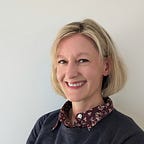Honouring Commitments
Weeknotes #16: Sept 8–11, 2020
“It’s easier to hold your principles 100 percent of the time than it is to hold them 98 percent of the time.” ― Clayton M. Christensen
This will probably be a short post — I’m feeling pretty foggy-headed with the rainy weather here in Ottawa. But I said I would write a post every week, so here I am.
After feeling a bit mentally stretched last week into areas that aren’t my expertise (project risk, program development, enterprise architecture), this week I found myself recoiling back a bit into areas I’m more familiar with. I may not understand the ins and outs of how the Government of Canada assesses project risk, but I do have experience in successful technology organizations, and I know the value of a strong user experience practice.
Since joining the team about four months ago, I’ve always had the sense that there was too much to do, and I struggled a bit in knowing where best to focus my efforts, as well as those of my small team. I finally realized this week that I was compromising on what I believed was best, in order to try to please people.
I should know better.
There is a difference between ‘giving someone what they ask for’ and ‘helping someone achieve the outcomes they’re looking for’. It can be intimidating to push back on a request, but I don’t want to simply be an order-taker, and deliver sub-par work because the person making the request didn’t know there were other ways to do things.
So, this week I provided what I think is a more realistic timeline of what we can achieve from a research perspective, given the resources available. I’ve really struggled with this sense that ‘we need to perform research across multiple products and multiple user segments.. as soon as possible”. I had created a ridiculous timeline that devoted only a few weeks to discovery for an entire product (with multiple distinct user segments) before rushing off to something else. I knew we won’t be able to do much more than a very high-level pass at this cadence. So yes, we could check the box to say we talked with people about their tasks, but I’m not confident we will get to the level of insights that can really make a difference when it comes to designing and delivering these products. And that is not the legacy I want to leave for myself and my team. As we are looking to raise the appreciation for the value UX can offer in the organization, I want to be very sure we’re not making unnecessary (and unrecognized) compromises in our work.
Thankfully, last weeks’ conversations also included talk of dedicated product teams, and we’ve discussed the importance of having UXers dedicated on teams. We don’t have all the resources now for these future product teams, so I am using this to relieve myself of this sense that I have to be doing all this discovery research in advance.
Ideally, we’d want members of these teams to all be involved in understanding the user needs they’re seeking to address. So I actually feel pretty good about pushing off on the research until the teams are formed. Otherwise, we run the risk of research sitting on a shelf, going stale, and then being rejected by the team anyway. I remember the light-bulb moment I had when I first heard of the DIKW Model and how it relates to UX Research.
We can gather data, interpret its meaning, and communicate that to others. But we really need to move up one more level to the level of wisdom, where we are able to understand, reflect on what we know, and then apply it. That step of cultivating wisdom is a doozy, and in the Interaction Design Foundation course where I was exposed to this model, they claimed that often a team needs to be actively involved through the research activities to be able to reach that level of wisdom.
So, after a few months of hesitating on where to focus my own efforts, as well as those of a member of my team, this week I finally took a step forward. We are going to dig deep, in an attempt to climb to these levels where we are not simply gathering data, but we’re able to reflect and make some valuable recommendations to improve the experience of the products we are working on.
I feel positive about this step forward. I feel like I had been holding back because I felt like there were so many possibilities, I didn’t know in which direction to go. Finally I feel like we can push forward and have a much better chance at success!
